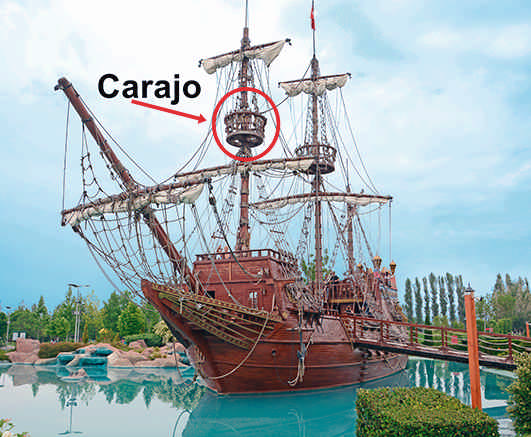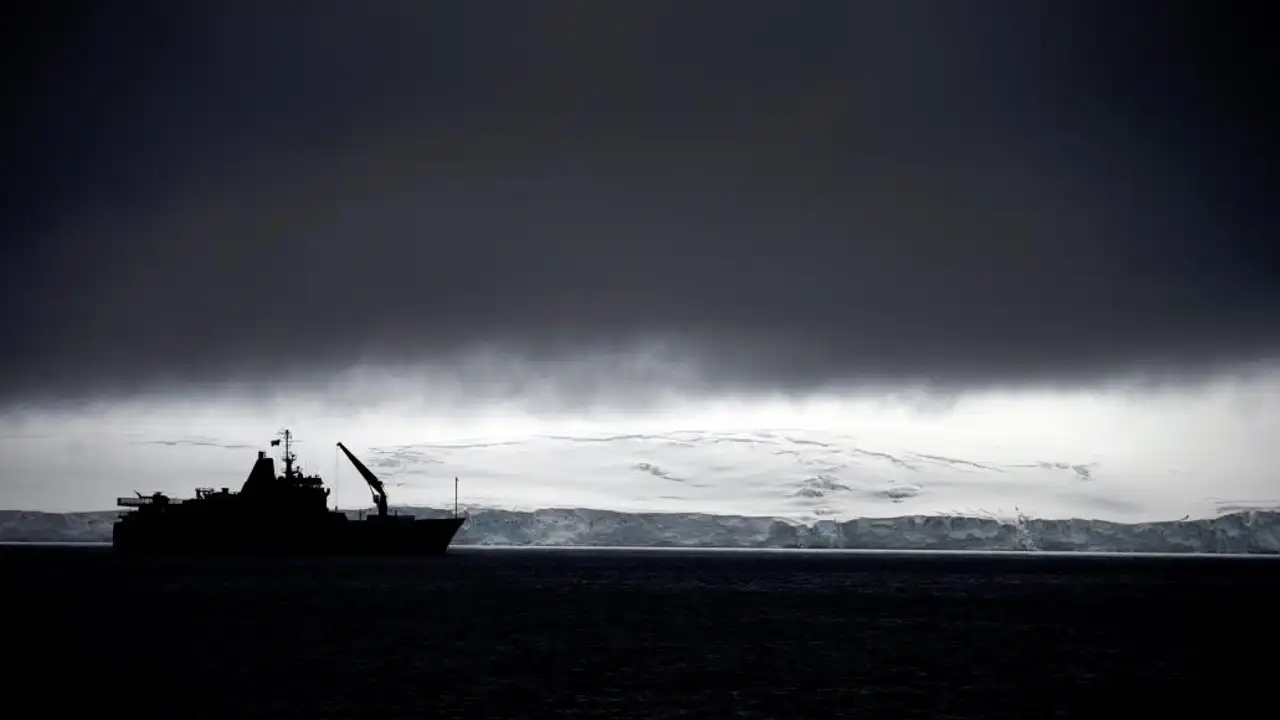The carajo, the crow’s nest, the “mamparitis”, and other seafarers expressions
By :Raúl Villa Caro
Secretary of EXPONAV
I’ve always found it curious to observe the strong attraction that maritime themes often hold for inland people. Because of this, seafaring metaphors often emerge, referring to episodes of everyday life.
As a result, many seafaring expressions, or those related to the sea, have been transferred into colloquial language, although sometimes with a different meaning than the original maritime one. Some of these expressions are included in the RAE (Royal Spanish Academy) with this second meaning, while others are not, such as “carajo“ (a word meaning “cofa“). And sometimes we even use everyday expressions, which we don’t realize have their origins in the maritime environment.
History of the “carajo” (the “carajo”)
According to many of the definitions circulating on the internet, and although not endorsed by the Royal Spanish Academy (RAE), it is said that in the past, the term “carajo” (the “carajo”) referred to a small basket found at the top of the mainmast of old ships

The “carajo,” given its dangerous location at the top of the mast, was a very unsafe place, as it was where the heavy rolling of ships was most noticeable.Therefore, legend has it that when a member of the crew committed a serious offense, they were taken to the “carajo“ (the “carajo”) as a form of punishment. This could be why, when we want to stop seeing someone, we use the expression, “go to hell
The Ship’s Roll and Distance
But returning to the ship, once the punished seafarer had finished his punishment in the “fuck,” he would descend from the platform, and at that time he was usually so seasick that he was unable to do any work. And this could be the reason why the expression “you’re not worth a damn” is sometimes used.
The location of the basket was high up on the mainmast and quite out of the line of vision of most of the crew. And this fact could be related to why when a person is at a great distance from us, we use the expression, “they are farther than hell.”

It should be noted that on the training ship Juan Sebastián Elcano, the oldest in the Navy, the crew refers to the upper platforms as “crow’s nests.” However, they reserve the term “crow’s nest” to refer to the highest point of the ship, located on the foremast, at a height of 51 meters. This is an important location because it represents the point where the stays (the ropes that hold the masthead) are formed.
RAE’s Position on “carajo”
As already mentioned, the RAE, among its numerous known meanings of the term, does not include the word “la canastilla” (the basket). On the contrary, among those included, we can highlight those that express situations of displeasure, rejection, surprise, or astonishment, such as the expression “eso está mas malo que el carajo” (that’s worse than carajo).
The RAE, through its “Spanish Today” department, has indicated after a consultation that in the academic dictionary this word has never had the meaning of lookout post (cofa) since it was included in 1983.
Although it also recognizes, as indicated in the dictionary, that it is a word of dubious origin, since, for example, in Rubén Poncio‘s “Diccionario Náutico Abreviado” (Brief Nautical Dictionary) from 1991, created with common nautical words from Argentina, the word “carajo” appears as a synonym for “cofa” (cofa). , the word in question appears with the meaning of a platform placed on top of a pole.

Seafaring Expressions
Among the most commonly used seafaring phrases in everyday life on land are the following: “to board,” “let each mast hold its own,” “to fall into the net,” “like a fish in water,” “against all odds,” “to call the shots,” “where there’s a skipper, the Seafarers doesn’t command,” “to sign up,” “to take on water,” “to show the course,” “to go down,” “to go adrift,” “ground swell,” “to be shipwrecked,” “to sail against the current,” “to lose the north,” “to put the bow (on a person),” “to float,” “to have guts,” “to throw overboard,” “to hit rock bottom,” “the wind is in our stern,” “to throw a cable,” or “to capsize.”
Likewise, among those expressions we sometimes use without knowing their nautical past, the following three could be highlighted: “tela marinera“ (seafarer’s cloth), “salvarse por los pinas” (a narrow escape route), and “a palo seco” (dry stick). Regarding the first, the RAE defines it as “great difficulty,” as it turns out that in the seafaring and port environments of the age of sailing ships, the fabric needed for their manufacture was “tela marinera“ (seafarer’s cloth): a lot of it, expensive to make, and high-priced.
Raúl Villa Caro writes :Airborne wind energy applied to ships
Regarding the second, in ancient times it was very common for sailors to let their long hair grow, since many embarked without knowing how to swim. Therefore, if they fell into the water, they could be “saved by the skin of their teeth” by being caught by their floating hair. As for the expression “a palo seco” (the one we use when drinking a drink without its lid, or vice versa), it was already used during the times of colonization to refer to sailing with the sails furled.

“Mamparitis”: An Illness on Board Ships
According to the Royal Spanish Academy (RAE), a “bulkhead” is a maritime term used to describe the iron plates used to divide the interior of a ship into compartments.
In other words, colloquially, we could consider bulkheads to be the walls of a ship. Curiously, many sailors have adopted a variant of this term, which does not exist in any dictionary, and which represents an ailment on board that every sailor has suffered at some point: “mamparitis.”
This phenomenon, closer to a state of mind than an illness, occurs as a result of having to live in a confined space divided by bulkheads for a very long period of time.
Raúl Villa Caro writes:Deus, the mastermind behind Supertanker
Among the reasons that contribute to the birth of this undesirable phenomenon, which can turn even the calmest of humans into an irascible being, we can find some of the following causes: living with few people and of multiple nationalities, fear of illness, overwork, the contract (sometimes it is not known with certainty when or where one will disembark), adverse weather conditions, family problems, or breakdowns that can worsen the quality of life on board.
The seafarers’ embarkation period has been reduced compared to what it once was, but it still generally amounts to a time interval exceeding three months. Faced with such long periods, once we’ve passed the halfway point of embarkation, the dreaded illness can set in, making us irascible in situations in which, at another time in life, or earlier on that same embarkation, we would have acted differently.
Among the symptoms that reveal the onset of “mamparitis,” which obviously vary from person to person, the following stand out: susceptibility, negativity, anxiety, depressive behavior, aggression, or even anger. In general, a series of conflicting factors will emerge that, at other times, would not have manifested themselves so virulently. Obviously, life on board will vary greatly depending on the type of ship and the conditions under which it is sailed.
Other typical expressions on board
A very peculiar expression on board, and also known internationally, is the way the crew refers to the captain of a merchant ship. He is often known as “the old man.” This typical expression may be related to the saying “A new ship, an old captain.
On the other hand, in Spain there are also expressions on land related to the sea, but which are only known in certain maritime provinces. For example, in Cádiz, when kids play soccer and kick the ball too high, and it falls onto an inaccessible roof, they use the expression “el pelota se ha embarcado,” referring to the fact that the ball has been stranded, just as sailors are on ships.
Seafarers’ Proverbs and Sayings

Of course, seafarers’ proverbs are very present in the collection of sayings. “Sorrows and waves never come alone,” “He who has been shipwrecked fears the calm sea,” or “There is no seafarer who cannot drown” are clear examples of this presence.
Meteorological proverbs constitute the catechism of working people in the fields and at sea. Based on these proverbs, they share the tasks of the fields and at sea in their daily tasks. In Galicia, the proverb “in April, a thousand waters” is true, which certifies the abundance of rain in this month. Curiously, despite the existing rainfall, the Galician proverbs focus more on temperatures (cold, heat, etc.) than on rainfall.




